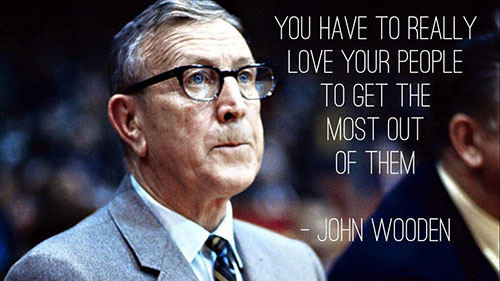Sales CRM question: I am a rep, how can I be a great salesperson?
As a practitioner of sales, and especially as someone who talks in public about building great sales machines using Sales CRM systems, I often get asked by reps from client organizations as well as webinar attendees from The Brutal Truth About Sales and Selling, “how do I become a great salesperson?” In fact, there are plenty of articles written about this question that are backed up by research and many from reputable people and organizations like HBR (Seven Personality Traits of Top Salespeople). I’d like to answer it from having actually experienced and done this myself. Instead of wowing you with reams of data and fancy graphs, I want to present a point of view of a practicing salesperson who has also had the privilege to work with thousands of salespeople and hundreds of sales organizations. My 2 cents to you are best captured in five questions:- Are you passionate about something and want to talk to others about it?
- Do you make others happy by showing genuine interest in them and by putting yourself out there?
- Can you deliver bad news to others, honestly, using your own moral compass?
- Can you motivate yourself to work for your customer however difficult it gets ?
- Do you know the difference between value and price, both to you and to others?
If you answered all five questions comfortably with a ‘Yes,’ you already are or will be a great salesperson! And yes, anyone can become a great salesperson at any age. Sales is the one area that has required no “school”, just experience. In fact, it is ironic that there is typically no undergraduate or graduate major called “sales” in any university, even in the 21st century! At the same time, we are not going to spend time here discussing the ABCs of sales or quotes from Zig Ziglar or what 5 phrases you need to say or things you need to do to close sales. This article is about knowing some of those timeless ideas on what it takes to go from good to great and learning from what one has seen in rainmakers in order to get to practical concepts that you can use everyday.
If you feel a technology is keeping you from being great, I’ll candidly tell you that you are flat-out wrong. A great Sales CRM system, like a treadmill, might facilitate your work (or workout), but you still need to put in the work. The ideas discussed below are just that - the simple work habits that one needs to put in to cross the threshold from a good to a great salesperson. For those of you interested in a deeper dive on intelligent Sales CRM tools, please read my other article here.
 A salesperson must have the motivation to help and goes the extra step to do so. It is not important whether you are already an expert or a beginner in your area. In fact, the more sources you use to construct your advice or answers, the more credible you are. If you keep answering from your own knowledge or understanding, your customer might start feeling that they are being ‘led on.’ At the same time, the more time you need to spend in collecting answers from others before answering your customer, you might be perceived as unreliable.
A salesperson must have the motivation to help and goes the extra step to do so. It is not important whether you are already an expert or a beginner in your area. In fact, the more sources you use to construct your advice or answers, the more credible you are. If you keep answering from your own knowledge or understanding, your customer might start feeling that they are being ‘led on.’ At the same time, the more time you need to spend in collecting answers from others before answering your customer, you might be perceived as unreliable.One of the best answers that good salespeople give to their customers is, “This is what I know about your question and I can show you the data to support it. If you want me to, I can ask for help from so-and-so and give you a deeper answer and more data.” This kind of statement shows the customer that you have answers and you have data to back them up and that you are also willing to ask for help if needed. It also goes miles in building your credibility in the customer’s eyes. are extroverted or introverted. Even introverts can be excellent in sales as long as there is a sense of ‘other-directedness’ in thought or action.
Showing authenticity to others would make you truly great in sales. In professional situations, this translates to knowing your customer really well i.e. what they would like or dislike, what they are struggling with but unable to state, what is awkward to bring up, what would make them enjoy or excel at their job, how to make them shine by helping them see ‘a better path’ and so on.
Genuine interest is when you reach out to the customer and ask them how they dealt with a challenging or ambiguous situation and what they felt about it. Or, it could be that you called to check-in on something that you both talked about (about a personal situation) or you really wanted to convey your congratulations to them for something that recently happened. There are many different ways to do this and there are salespeople who are brilliant at it.
Showing interest in others is where the salesperson’s ability to cultivate and nurture personal relationships becomes a serious credibility asset. The stronger this asset, the more effective your professional conversations. Human beings tend to see you as the sum total of words and actions you take. If the words match the actions, credibility and trust increases. If they contradict, the game is lost.
 If you get better at delivering bad news to yourself and to your customers, you would not be mixing words. People would see you as credible, and as someone who is trusted because you have their interests at heart. Having that moral compass gives the salesperson the ability to do the right thing and use their influence for the benefit of their customers.
If you get better at delivering bad news to yourself and to your customers, you would not be mixing words. People would see you as credible, and as someone who is trusted because you have their interests at heart. Having that moral compass gives the salesperson the ability to do the right thing and use their influence for the benefit of their customers.
Great salespeople take pride in their work, have an excellent work ethic, want to help others and show grit. They show themselves as who they are, and do not hide. They do not show negativity when dealing with people and take a lot of effort to ensure they don’t burden their customers. Of course, salespeople, just like any others, want to succeed at their jobs. As a salesperson’s measure of success is very cut-and-dry (how much sales they brought in), they can measure themselves easily and are motivated by goal-setting. They also want to earn commissions that are ‘good’ (as a reward for doing good things for others). Bear in mind that earning a lot of commissions and setting goals to make money in sales is not a bad thing. If that motivates you to go the extra mile and move mountains with your moral compass, more power to you!

Customers are not created equal. They say and do what they please. They may be polite or mean, honest or deceptive, truthful or untruthful, political or apolitical, hurried or patient, exacting or accommodative, rich or poor and so on and so forth. There is no limit to what the customer can get away with. Sam Walton, the founder of Walmart, famously said, “The customer has the power to fire anyone in the company, right up to the chairman of the board, simply by spending their money elsewhere.” If you truly understand and embrace this, and are willing to get into tough situations with them and don’t mind bending over backwards day-in and day-out, and you see compromising as winning and you can do all this without being a jerk or showing you are ‘above’ them, you will truly be a great salesperson!
Salespeople really must know how to construct value for the customer. If that is not done, the customer would see your product or service just as an expense (and no one likes expenses). Value means demonstrating the context of the expense in the right manner. Take insurance for example. If you merely tell someone, “here’s how good my insurance policy is and I’d ask you to get it too,” there is literally no chance that they would buy from you. However, if you asked, “how worried are you about putting your family in the worst financial situation if something were to happen to you?” you would have that person’s attention. You have just shown them to consider the pain that might be caused on their near-and-dear and by taking some simple steps (buying insurance), they can avoid that. That is value and your customer would not think of the insurance premium as a discretionary expense anymore. If you are interested in a comprehensive understanding of value vs. price, read this McKinsey article here.
 Great salespeople have only one boss - the customer. As they go to the extremes to serve that boss, they also take great pains in treating people the right way and get more motivated while doing so. Motivating oneself with money is good for goal-setting but one has to take it to the next level of being a credible and trusted advisor to the customer, however difficult that gets. The difficulty shows up everyday when, while taking the customer’s viewpoint, you are able to rationalize an expense to them by couching it in the right context and for the right outcomes. We all know that sales is about price vs. value. If you want to be a great salesperson, you have to go the extra step in showing the customer the path to something greater by working with you.
Great salespeople have only one boss - the customer. As they go to the extremes to serve that boss, they also take great pains in treating people the right way and get more motivated while doing so. Motivating oneself with money is good for goal-setting but one has to take it to the next level of being a credible and trusted advisor to the customer, however difficult that gets. The difficulty shows up everyday when, while taking the customer’s viewpoint, you are able to rationalize an expense to them by couching it in the right context and for the right outcomes. We all know that sales is about price vs. value. If you want to be a great salesperson, you have to go the extra step in showing the customer the path to something greater by working with you.
All said and done, many salespeople have most of these qualities. The challenge is to reveal those qualities consistently and to everyone all the time. Perhaps a simpler way to think about good-to-great in sales is by looking at great teachers or coaches. A great coach can not only impart knowledge in the most suitable manner to their students, but he or she can also reveal something greater in them, something that the students themselves never knew was possible.
About the author

Mack Sundaram
I love sales, learning it, doing it and practicing it every minute of every day. Prospecting drives me to come to work and makes me a better professional. Let’s make it rain together as a team. You can find me on LinkedIn.